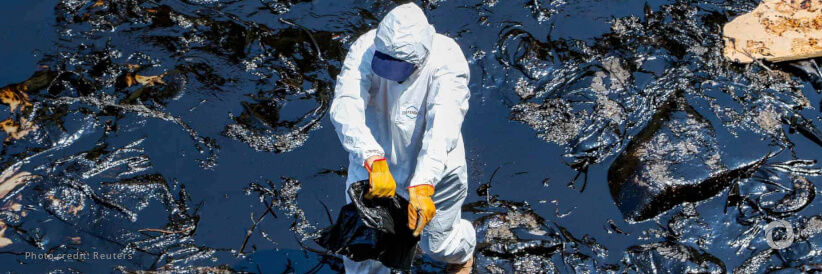One month after a devastating oil spill in Ecuador affected more than 300,000 people, the International Federation of Red Cross and Red Crescent Societies (IFRC) and the Ecuadorian Red Cross have distributed over 1.8 million liters of safe water to communities whose water sources were contaminated or where piped water service was suspended.
In Esmeraldas—the province hardest hit by the oil spill—1.2 million liters of water have been delivered. An additional 622,000 liters have supported communities affected by ongoing heavy rains and floods. The rainy season has left over 139,000 people in urgent need of assistance, particularly in the provinces of El Oro, Guayas, and Manabí.
“Clean water continues to be one of the most urgent needs in communities affected by the oil spill and floods, ” said the Ecuadorian Red Cross president, Dr. Roque Soria. “Our priority is to ensure that families have access to sufficient quantity and quality water for drinking, cooking, washing and keeping animals and crops alive, especially in rural areas.”
To scale up water distribution, a M15 large-capacity Emergency Response Unit (ERU) purification system mobilized by the Honduran and other Red Cross partners has arrived in Ecuador. This sophisticated treatment unit is expected to produce safe drinking water for more than 15,000 people per day in the most affected communities in Esmeraldas. A water, sanitation, and hygiene (WASH) specialist from Honduras has also been deployed to support its installation and operation.
This effort is part of a broader international response coordinated by the IFRC, which has launched an Emergency Appeal for 4.5 million Swiss francs to support over 176,000 people over the next 12 months. To date, only 11% of this money has been raised. The appeal aims to protect lives and livelihoods across the 14 provinces where the combined impact of the oil spill and severe flooding continues to disrupt daily life.
Since the first days of the emergency, Red Cross volunteers have provided medical care and psychosocial support and distributed food, cooking kits, essential hygiene items, and tools to clean homes and properties damaged by flooding, reaching more than 14,000 people.
“The response to the oil spill and the floods requires a sustained and coordinated effort,” said the IFRC’s Regional Director for the Americas, Loyce Pace. “We are working closely with the Ecuadorian Red Cross, sister Red Cross Societies, and partners to ensure no one is left behind, but increased international support is critical to meet growing humanitarian needs and help communities recover with dignity and resilience.”

